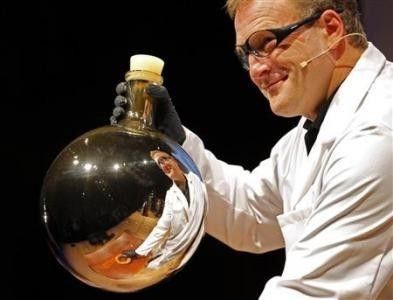Beetle Sex, Wasabi Alarm Win Ig Nobel Prizes [Full List of Winners]

Every year, just before the Nobel Prizes are announced and around the time the list is issued for the National Medals of Science and Technology, the Ig Nobel Prizes are handed out.
The Ig Nobels recognize improbable scientific achievements that at first make you laugh, and then make you think. The ceremony took place Thursday at Harvard University. Among the winners were chemistry researchers who built a wasabi fire alarm, medical researchers who described how the urge to urinate can affect people's decision-making, and biology researchers who showed that male buprestid beetles enjoy copulating with Australian beer bottles called stubbies.
Former winners of the real Nobel Prizes hand out the Ig Nobels at the ceremony.
Here is a full list of the 2011 winners. Click on the links to learn more about them and their research.
-- PHYSIOLOGY PRIZE: Anna Wilkinson (of the UK),Natalie Sebanz (of the Netherlands, Hungary, and Austria), Isabella Mandl (of Austria) and Ludwig Huber (of Austria) for their study No Evidence of Contagious Yawning in the Red-Footed Tortoise.
-- CHEMISTRY PRIZE: Makoto Imai, Naoki Urushihata, Hideki Tanemura, Yukinobu Tajima, Hideaki Goto, Koichiro Mizoguchi and Junichi Murakami of Japan, for determining the ideal density of airborne wasabi (pungent horseradish) to awaken sleeping people in case of a fire or other emergency, and for applying this knowledge to invent the wasabi alarm.
-- MEDICINE PRIZE: Mirjam Tuk (of the Netherlands and the UK), Debra Trampe (of the Netherlands) and Luk Warlop (of Belgium). and jointly to Matthew Lewis, Peter Snyder andRobert Feldman (of the U.S.), Robert Pietrzak, David Darby, and Paul Maruff (of Australia) for demonstrating that people make better decisions about some kinds of things - but worse decisions about other kinds of things‚ when they have a strong urge to urinate.
-- PSYCHOLOGY PRIZE: Karl Halvor Teigen of the University of Oslo, Norway, for trying to understand why, in everyday life, people sigh.
-- LITERATURE PRIZE: John Perry of Stanford University, USA, for his Theory of Structured Procrastination, which says: To be a high achiever, always work on something important, using it as a way to avoid doing something that's even more important.
-- BIOLOGY PRIZE: Darryl Gwynne (of Canada and Australia and the UK and the U.S.) andDavid Rentz (of Australia and the U.S.) for discovering that a certain kind of beetle mates with a certain kind of Australian beer bottle
-- PHYSICS PRIZE: Philippe Perrin, Cyril Perrot, Dominique Deviterne and Bruno Ragaru (of France), and Herman Kingma (of the Netherlands), for determining why discus throwers become dizzy, and why hammer throwers don't.
-- MATHEMATICS PRIZE: Dorothy Martin of the U.S. (who predicted the world would end in 1954),Pat Robertson of the U.S. (who predicted the world would end in 1982), Elizabeth Clare Prophet of the U.S. (who predicted the world would end in 1990), Lee Jang Rim of Korea (who predicted the world would end in 1992), Credonia Mwerinde of Uganda (who predicted the world would end in 1999), and Harold Camping of the U.S. (who predicted the world would end on Sept. 6, 1994 and later predicted that the world will end on Oct. 21, 2011), for teaching the world to be careful when making mathematical assumptions and calculations.
-- PEACE PRIZE: Arturas Zuokas, the mayor of Vilnius, Lithuania, for demonstrating that the problem of illegally parked luxury cars can be solved by running them over with an armored tank.
-- PUBLIC SAFETY PRIZE: John Senders of the University of Toronto, Canada, for conducting a series of safety experiments in which a person drives an automobile on a major highway while a visor repeatedly flaps down over his face, blinding him.
© Copyright IBTimes 2025. All rights reserved.






















